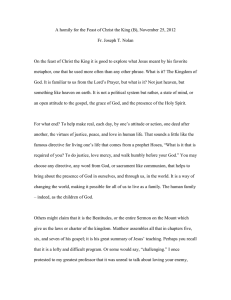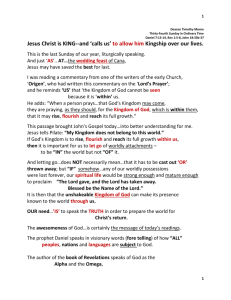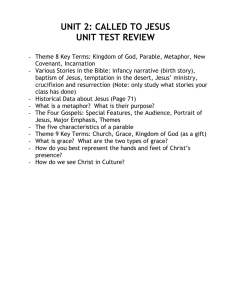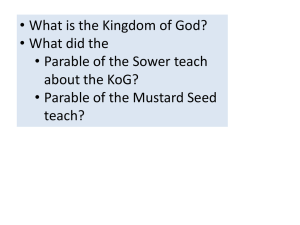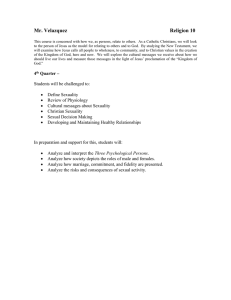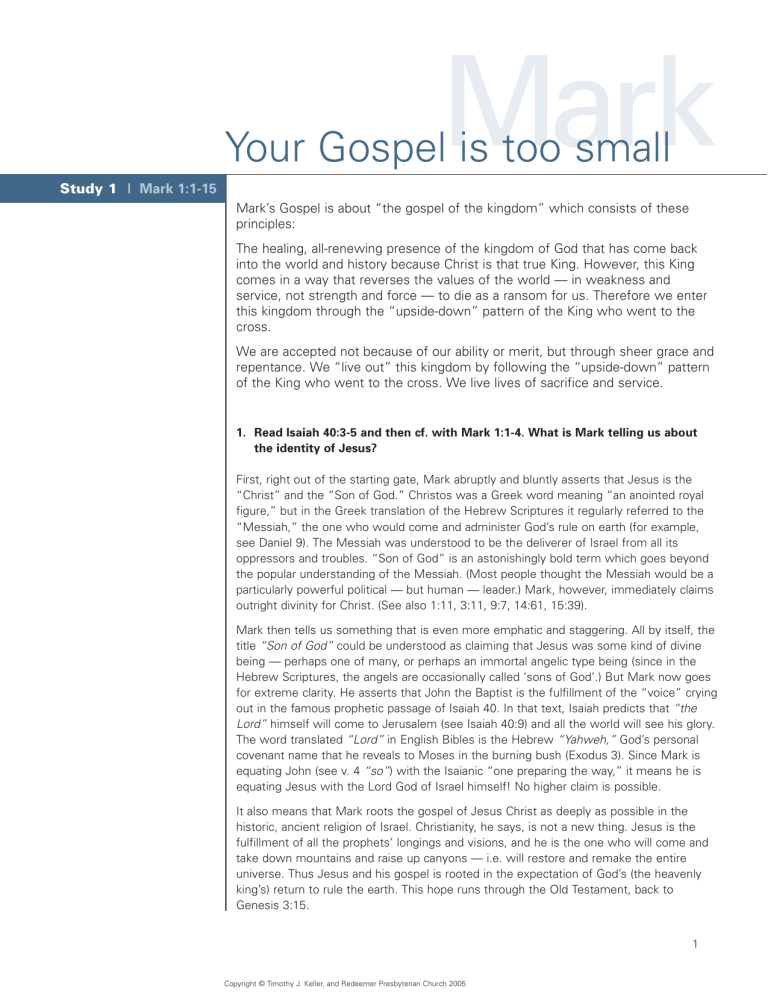
Mark Your Gospel is too small Study 1 | Mark 1:1-15 Mark’s Gospel is about “the gospel of the kingdom” which consists of these principles: The healing, all-renewing presence of the kingdom of God that has come back into the world and history because Christ is that true King. However, this King comes in a way that reverses the values of the world — in weakness and service, not strength and force — to die as a ransom for us. Therefore we enter this kingdom through the “upside-down” pattern of the King who went to the cross. We are accepted not because of our ability or merit, but through sheer grace and repentance. We “live out” this kingdom by following the “upside-down” pattern of the King who went to the cross. We live lives of sacrifice and service. 1. Read Isaiah 40:3-5 and then cf. with Mark 1:1-4. What is Mark telling us about the identity of Jesus? First, right out of the starting gate, Mark abruptly and bluntly asserts that Jesus is the “Christ” and the “Son of God.” Christos was a Greek word meaning “an anointed royal figure,” but in the Greek translation of the Hebrew Scriptures it regularly referred to the “Messiah,” the one who would come and administer God’s rule on earth (for example, see Daniel 9). The Messiah was understood to be the deliverer of Israel from all its oppressors and troubles. “Son of God” is an astonishingly bold term which goes beyond the popular understanding of the Messiah. (Most people thought the Messiah would be a particularly powerful political — but human — leader.) Mark, however, immediately claims outright divinity for Christ. (See also 1:11, 3:11, 9:7, 14:61, 15:39). Mark then tells us something that is even more emphatic and staggering. All by itself, the title “Son of God” could be understood as claiming that Jesus was some kind of divine being — perhaps one of many, or perhaps an immortal angelic type being (since in the Hebrew Scriptures, the angels are occasionally called ‘sons of God’.) But Mark now goes for extreme clarity. He asserts that John the Baptist is the fulfillment of the “voice” crying out in the famous prophetic passage of Isaiah 40. In that text, Isaiah predicts that “the Lord” himself will come to Jerusalem (see Isaiah 40:9) and all the world will see his glory. The word translated “Lord” in English Bibles is the Hebrew “Yahweh,” God’s personal covenant name that he reveals to Moses in the burning bush (Exodus 3). Since Mark is equating John (see v. 4 “so”) with the Isaianic “one preparing the way,” it means he is equating Jesus with the Lord God of Israel himself! No higher claim is possible. It also means that Mark roots the gospel of Jesus Christ as deeply as possible in the historic, ancient religion of Israel. Christianity, he says, is not a new thing. Jesus is the fulfillment of all the prophets’ longings and visions, and he is the one who will come and take down mountains and raise up canyons — i.e. will restore and remake the entire universe. Thus Jesus and his gospel is rooted in the expectation of God’s (the heavenly king’s) return to rule the earth. This hope runs through the Old Testament, back to Genesis 3:15. 1 Copyright © Timothy J. Keller, and Redeemer Presbyterian Church 2005 notes YOUR GOSPEL IS TOO SMALL 2. How, specifically, does John ‘pave the way’ for the Lord? i.e. What do verses 48 tell us about how the Messiah, the king, is to be received? a) First, v. 4 - Repentance is the way to receive him. “So” means that John “prepared the way of the King” with repentance and seeking forgiveness of sins. But what does ‘repentance’ really mean? We have an indication in the very call to be baptized. A major part of Jewish worship and ceremony was the various ablutions and washings that had to occur constantly. They represented the need for being holy and cleansed from sin in order to stand before a holy God. Ordinarily, this meant washing one’s hands before going in to the temple, and so on. Only Gentile converts who wanted to be part of Israel’s worship had to be baptized thoroughly (by effusion or immersion) as part of the ceremonial rites that made one “clean” and fit for the presence of God. Jews were never baptized because they were already considered “clean.” But John’s ministry was very startling. It called every one to be baptized. It signified, first, that your pedigree and moral record did not matter. Everyone was going to have to be saved by grace to enter this kingdom. Secondly, it signaled the need for complete newness — a new people of God would need to be formed, and a new covenant with God would have to be made. No wonder John’s ministry caused such a stir! His ministry of baptism was so unique that he could be called “the Baptist” — because no one else had ever done such a thing! He was declaring (what the prophets had said), that the ceremonial laws of the Old Testament were only pointers to something else — that no one was “fit” for the kingdom except through grace, that a radical salvation was needed. b) Second, v. 7 – The baptism with the Spirit is the way to meet the king (or, perhaps more accurately, is a sign that you have met the king, since he is the one who baptizes with the Spirit). This statement and the immediate baptism by Jesus with the Spirit shows that water baptism is only a symbol of being cleansed. It does not literally cleanse from sin. The baptism with the Spirit is something that every Christian receives when he or she believes — it unites the person to Christ, into his “body”. See I Cor. 12:13 (“for we were all baptized by one Spirit into one body — whether Jews or Greeks, slave or free.”) c) vv. 7-8 – An attitude of submission to the Messiah and a recognition of his high stature. This statement by John is remarkable. Since it was considered so demeaning to deal with smelly feet that even a slave by Jewish law could not be required to do such service. Yet John does not merely say, “I will untie his sandals,” but actually insists that he is not worthy even to aspire to that! This means that the Messiah is of enormous stature and dignity, and our obligation of service to him is as radical and complete as can be. We are his, completely his. He is our absolute Lord, and we must acknowledge him as such. 3. What do verses 9-13 tell us about what ‘the baptism of the Spirit’ means and brings to us? a) v.10-11 – The baptism with the Spirit is ‘a spirit of sonship’. Of course, the Holy Spirit brings “power” as most readers of the Bible know. But what is the nature of that 2 Study 1 | Your Gospel is too small Copyright © Timothy J. Keller, and Redeemer Presbyterian Church 2005 YOUR GOSPEL IS TOO SMALL power? It is not just abstract “strength” to do things. The power the Spirit brought Jesus was an immediate, direct assurance that he was a) loved by and b) pleasing to his Father. That is what the voice from heaven said to him. Was this a unique gift to Jesus only? At one level — the answer is yes, because Jesus’ “sonship” is different than ours. He is the eternal, natural, unique Son of God. But the Bible tells us that we too are children of God. First, we become children of God as we are “born again” (John 1:1213) which happens by the Spirit (John 3:1ff.) So in that sense, the Spirit makes us children of God. When we believe in Christ, the Spirit comes in and imparts God’s own life and nature to us, even as biological children receive their parents’ nature. But there is an additional work of the Spirit. Romans 8:15-16 tells us that the Spirit of God “witnesses to our spirits that we are children of God”. This means that though we (“our spirits”) may know that we are children of God through faith in Jesus Christ, our hearts rather desperately need direct assurance. It is hard to believe “down deep” that we are unconditionally and even counter-conditionally loved by God as our Father. So the Spirit’s job is to “witness with our Spirit” — to flood our hearts sometime with this direct assurance, even as the Spirit did so with Jesus at his baptism. This then is the “secret” of how the Holy Spirit brings us power. He makes us God’s children and then continually reminds us of it, pressing and leading us to live in the confidence, purity, joy, and wonder that is consistent with that tremendous fact. notes Baptism: During John’s time, the Jews often administered baptism as a rite of purification for Gentiles who were converting to Judaism. John went one step further, preaching that Jews as well as Gentiles needed to be baptized as a sign of turning from sin. b) v.12-13 - The Spirit of sonship makes the wilderness a place of growth. Notice that “the Spirit sent him out into the desert.” Jesus enters the desert where he is tried and tested. This is not an accident, but part of the Spirit’s work in our lives. The result is not demoralization or weakening, but (v. 14ff) an empowering. Christians can expect that suffering will make us (not break us) if we know we are God’s children. (See Romans 5:2-5 “we also rejoice in our sufferings, for suffering produces hope… for God has poured out his love into our hearts by the Holy Spirit, whom he has given us.”) NOTE: Mark was writing to Christians who were being executed by being thrown to animals in the Roman arenas. Here is amazing comfort — Jesus had been with the wild beasts, too! 4. What do verses 14-15 tell us about the essential message of the King? a) What is explained? b) What is left “mysterious” and unexplained in Jesus proclamation? a) The essential message of the king is: (1) First (“good news” v. 14) something has happened in history. (2) Second (“the kingdom of God is near”) the thing that has happened is that the God-King himself has come into history! (There cannot be a kingdom without a king. Thus to say the kingdom of God is almost here is to say that God the King is about to come and set up his rule.) (3) Third (“repent and believe the gospel”) the way to relate to this king and kingdom is not through making oneself worthy or accomplishing great deeds but through admitting your sin (repentance) and believing in the king. b) What is left mysterious is: (1) Who is this king? If the kingdom of God is near, then the king is near —so who is he and where is he? Of course the reader has already been told who the God-King is (vv. 1-4) but we are now going to see how the answer to this mystery (“who and where is the king?”) will be slowly revealed to the people of Judea. 3 Copyright © Timothy J. Keller, and Redeemer Presbyterian Church 2005 notes Time: The Greek word here refers not so much to a date on the calendar as if does to a decisive time when God acts in a special way. Jesus says the time has come, indicating a crisis point has arrived. YOUR GOSPEL IS TOO SMALL The people of course were waiting desperately for a Liberator —so this announcement must have created enormous excitement. (2) Why is the kingdom only “near” if Jesus is the king? There is a mystery even for us the readers. We know that Jesus is the king. But if that is so — why does Jesus only say the kingdom is “near”? Why not say “the kingdom of God is here because I am here!” If Jesus is the king, but the kingdom is only near, then in some way Jesus has not “set up” his kingdom. Something has to happen — something has to be done if his kingdom power and rule is going to be established and do its great liberating work. While the first mystery (“who is the king?”) is the subject of the first half of Mark, from chapter 1 through 8, the second mystery (“what did he come to do?”) is the subject of the second half of the book, from chapters 9 through 16. 5. Everyone notices the abruptness and breathless speed of Mark’s narrative style. Everything happens so quickly, all the statements and descriptions are extremely terse and direct. What do you think Mark is trying to get across? First, “the world according to Mark is a world torn open by God” (Richard Hays). Mark immediately tells us Jesus is the Son of God. The heavens are “torn open” at Jesus’ baptism (1:10). Mark is telling us that God has “broken in” to history. His style gets across a sense of crisis, and conveys that the status quo has been ruptured. We can’t think of history as a closed system of natural causes any more. We can’t think of any human system or tradition or authority as inevitable or absolute any more. “God’s abrupt intervention fractures apparent… continuities, and human life is laid bare before God.” (Hays) Jesus has come; anything can happen now. Second, Mark wants us to see that the coming of Jesus calls for decisive action. Jesus is seen as a man of action, moving quickly and decisively from event to event. There is very little teaching in the Gospel of Mark. Mainly, we see Jesus’ doings. It is his deeds that save us, and therefore we need to respond actively. We must repent, believe, follow him. We can’t remain neutral. We must not sit and reflect and find excuses for not changing our lives now. 6. What was the most helpful or impressive thing that you learned today personally? What practical application can you make from today’s lesson? 4 Study 1 | Your Gospel is too small Copyright © Timothy J. Keller, and Redeemer Presbyterian Church 2005 YOUR GOSPEL IS TOO SMALL notes 7. Look back over the whole section. What have we learned about what “the gospel” is? today’s lesson? First, the gospel is that we are saved by his work, not ours (vv.1-8). Second the gospel is that we can be adopted sons and daughters of God (vv.9-13). Third, the gospel is that the kingdom of God, the liberating power of God, has come (vv.14-15). There may be other things you learn about the gospel from this passage as well. Remembering the big picture Prayer requests Who Jesus is: He’s the Christ (1:1 and 8:29). He’s the “good news” that God promised would come. He’s the “good news” of victory (1 Samuel 31:9). Mark’s Gospel is about Jesus. Why Jesus came: To solve the problem of sin introduced by the Fall (1:4, 1:13, 1:15, 15:38). How should I respond? Not by opposition (1:14, 3:6), but by repentance and faith (1:15, 2:5 etc.). Mark’s book will demand commitment and change. 5 Copyright © Timothy J. Keller, and Redeemer Presbyterian Church 2005 The Kingdom of God OPTIONAL STUDY This section has been summarized from How to Read the Bible for All It’s Worth by Gordon D. Fee and Douglas Stuart, (Zondervan, pp. 131-134). In understanding Jesus’ teaching and ministry, it is important to understand the kingdom of God in the ministry of Jesus. The Jews of Jesus’ day thought they were on the very brink of time, when God would step into history and bring an end to this age and usher in the age to come. The Greek word for the end they were looking for is ‘eschaton.’ Thus to be eschatological in one’s thinking meant to be looking for the end. The earliest Christians well understood this eschatological way of looking at life. For them, the events of Jesus’ coming, his death and resurrection, and the giving of the Spirit were all related in their expectations about the ‘coming of the end.’ The coming of the end also meant a new beginning — the beginning of God’s new age — the messianic age. The new age was also referred to as the kingdom of God, which meant “the time of God’s rule.” This new age would be a time of righteousness (Isaiah 11:4-5), and people would live in peace (Isaiah 2:2-4). It would be a time of the fullness of the Spirit (Joel 2:28-30) when the new covenant spoken of by Jeremiah would be realized (Jeremiah 31: 31-34, 32:3840). Sin and sickness would be done away with (Zechariah 13:1). Even the material creation would feel the joyful effects of this new age (Isaiah 11:6-9). Jesus came and announced that the coming kingdom was at hand with his ministry (Mark 1:14-15). He cast out demons, worked miracles, and freely accepted the outcasts and sinners — all signs that the end had begun (Luke 11:20; Matthew 11:2-6; Luke 14:21; 15:1-2). Everyone kept watching him to see if he really was the coming one. Would he really bring in the messianic age with all of its’ splendor? Then suddenly he was crucified — and the lights went out. But no! There was a glorious sequel. On the third day he was raised from the dead and he appeared to many of his followers. Surely now he would “restore the kingdom of Israel” (Acts 1:6). But instead he returned to the Father and poured out the promised Spirit. Very early, beginning with Peter’s sermon in Acts 3, the early Christians came to realize that Jesus had not come to usher in the final end, but the “beginning” of the end, as it were. Thus they came to see that with Jesus’ death and resurrection, and with the coming of the Spirit, the blessings and benefits of the future had already come. In a sense, therefore, the end had already come. But in another sense, the end had not yet come. Thus it was “already,” but “not yet.” The early believers, therefore, learned to be truly eschatological people. They lived between the times — that is, between the beginning of the end and the consummation of the end. Because the kingdom, the time of God’s rule, has been inaugurated with Jesus’ own coming, we are called to life in the kingdom, which means life under his lordship, freely accepted and forgiven. But also committed to Jesus’ Kingdom priorities of the new age and to seeing them worked out in our own lives and the world in this present age. 6 Copyright © Timothy J. Keller, and Redeemer Presbyterian Church 2005 THE KINGDOM OF GOD The Meaning of “The Kingdom” – Biblical Texts and Implications 1. “Then all the trees of the forest will sing for joy; they will sing before the Lord, for he comes, he comes to judge the earth.” Psalm 96:11-12. Implications: God created the world to be under his rule — all things were made to be managed by him. Things blossom and find fulfillment only under his rule. 2. “Cursed is the ground because of you; through painful toil you will eat of it all the days of your life. It will produce thorns and thistles for you…” Genesis 3:17-18; cf. Romans 8:18ff. Implications: All areas of life are subject to disintegration and alienation when they are not under the Kingship of Christ: our relationship with God (spiritual), with ourselves (psychological), with other persons (social) and with nature itself (physical). 3. “And he made known to us the mystery of his will according to his good pleasure, which he purposed in Christ… to bring all things in heaven and on earth together under one head, even Christ.” Ephesians 1:9-10; cf. vv.19-23 Implications: The plan of God is to unite the disintegrating life of the world with the life of heaven by bringing all things under the Kingship of Christ. “Thy kingdom come, thy will be done on earth as it is in heaven.” 4. “The time has come — the kingdom of God is near…” Mark 1:15. “The kingdom of God is in you.” Luke 17:21 “When you see these things happening, you know that the kingdom of God is near.” Luke 21:31 “If I drive these demons out by the Spirit of God, then the kingdom of God has come upon you.” Matthew 12:28. Implications: The kingdom is here now (Luke 17 and texts) but not fully (Matthew 6:10 and texts). Like a seed, the kingdom’s presence is nearly hidden, but revolutionary, and finally it grows into fullness, to overcome all resistance to God’s rule (Matthew 13:31-32). 5. “Pray… thy kingdom come!” Matthew 6:10 “Then the King will say to those on his right — come, take your inheritance, the kingdom.” Matthew 25:34 “The seed… is the message of the kingdom…” Matthew 13:18-19. 7 Personal reading | The Kingdom of God Copyright © Timothy J. Keller, and Redeemer Presbyterian Church 2005 THE KINGDOM OF GOD Implications: The kingdom is entered by the repentance and the new birth (John 3) and the healing of every area of life and relationship begins (Romans 14). 6. “I tell you the truth, no one can see the kingdom of God unless he is born again… no one can enter the kingdom of God unless he is born of water and the Spirit…” John 3:3, 5 Implications: The kingdom advances in the world and in our lives through the “weapons” of the kingdom — the word (the King’s will) and the Spirit (the King's power) (2 Corinthians 10). Because the kingdom is “already” but “not yet”, we feel ourselves caught in the tension of living in both realms (Romans 12:2; 13:11-14; I Thessalonians 5:4-8). We are already saved, yet shall be saved (Romans 8:24, 5:9-11), we are already redeemed yet will be redeemed (Colossians 1:14 and Ephesians 4:30), we are already adopted yet we will be adopted (Romans 8:15,23), we are already reigning in heaven as kings (Ephesians 2:6; Revelation 1:8), yet we do not see ourselves reigning yet (Hebrews 2:8). Paul sorts this out by saying, we are legally righteous (justified – Romans 5:1-5; 8:1) yet we are not yet actually righteous (Romans 8:2-4). 7. “For the kingdom of God is not a matter of eating and drinking, but of righteousness, peace, and joy in the Holy Spirit, because anyone who serves Christ in this way is pleasing to God and approved by men.” Romans 14:17-18 Implications: Christians are a model of the kingdom, a counter-culture, a royal colony of heaven here to display how human society can be under the Kingship of Christ (2 Peter 2) We are also agents of the kingdom, spreading its healing both in word (Acts 8) and through deed ministry (I John 3:17-18), spiritually, psychologically, socially, physically. Our spiritual gifts are kingdom powers which heal people as they bring people under the Kingship of Christ. 8. “The weapons we fight with are not the weapons of the world. On the contrary, they have divine power to demolish strongholds… every pretension that sets itself up against the knowledge of God, and we take captive every thought to Christ.” 2 Corinthians 10:4-5 Implications: cf. Matthew 10:37 with Luke14:26. It shows that “hate” means “loved less.” Also, the two men in Luke 9 were perhaps being tested as the rich young ruler with an absolute demand, to indicate whether they would give Christ pre-eminence. To enter the kingdom takes absolute commitment to the King! Yet, to think you can enter the kingdom through the merits of your obedience is to rely on yourself as your own savior and to keep control of your life. You can only enter the kingdom through relinquishing your own good deeds 8 Copyright © Timothy J. Keller, and Redeemer Presbyterian Church 2005 THE KINGDOM OF GOD and asking for his mercy alone (John 1:12). To imagine that you can enter because of your obedience is to stay in charge of your own life! You enter by submitting to him, but only because he died for you. 9. “But you are a chosen people, a royal priesthood, a holy nation, a people belonging to God, that you may declare the praises of him who called you out of darkness into his marvelous light.” I Peter 2:9 “They believed Phillip as he preached the good news of the kingdom of God.” Acts 8:12 “But to each one of us grace (gifts) has been given as Christ apportioned it. This is why it says, ‘When he ascended on high, he led captives in his train and gave gifts to men’” Ephesians 4:7-8 “If anyone comes to me and does not hate his father and mother, his wife and children, his brothers and sisters — yes, even his own life — he cannot be my disciple. And anyone who does not carry his cross and follow me cannot be my disciple.” Luke 14:26-27 He said to another man, “Follow me.” But the man replied, “Lord first let me go and bury my father.” Jesus said to him, “Let the dead bury their own dead, but you go and proclaim the kingdom of God.” Still another said, “I will follow you, Lord; but first let me go back and say goodbye to my family.” Jesus replied, “No one who puts his hand to the plow and looks back is fit for service in the kingdom of God.” Luke 9:59-62 Summary: the kingdom of God is the renewal of the whole world through the entrance of supernatural forces — the Word, the Spirit, the church (where the Word and Spirit dwell). 9 Personal reading | The Kingdom of God Copyright © Timothy J. Keller, and Redeemer Presbyterian Church 2005 THE KINGDOM OF GOD “The Kingdom in Your Life” – Biblical Texts and Implications “He is the image of the invisible God, the firstborn over all creation. For by him all things were created; things in heaven and on earth, visible and invisible, whether thrones or powers or rulers or authorities; all things were created by him and for him. He is before all things, and in him all things hold together. And he is the head of the body, the church; he is the beginning and the firstborn from the dead, so that in everything he might have the pre-eminence. For God, was pleased to have all his fullness dwell in him, and through him to reconcile to himself all things on earth or things in heaven, by making peace through his blood, shed on the cross.” Colossians 1:15-20 IMPLICATIONS: 1. “All things were created by him and for him.” a) BY: Jesus alone has built all things. Thus he alone understands how any person or relationship should function. His Word is the “manufacturer’s manual”. b) FOR: All people were built for a purpose — to belong to Christ. This means that only Christ has rights of ownership (and a creator has absolute rights.) 2. “In him all things hold together.” Since we were built for him, we experience disintegration when we are not under His Kingship. To the extent that we submit to His Lordship, wholeness flows into our lives. “God is reconciling all things to himself… through the cross.” It is by Christ’s death for sins that God is reuniting all things to himself. When we trust in Jesus’ death for our sins, we are reconciled to God, enter the kingdom, and the wholeness spreads in through our life. 3. “In everything he might be pre-eminent.” A believer must look at every area of his or her life and ask: “Is Christ pre-eminent here?” “What does it mean, then, to allow Jesus to be Lord of our lives?… Just this: whatever controls us is our lord. The person who seeks power is controlled by power. The person who seeks acceptance is controlled by the people he or she wants to please. We do not control ourselves. We are controlled by the lord of our life. If Jesus is our Lord, then he is the one who controls, he has the ultimate power. There are no bargains. We cannot manipulate him by playing ‘let’s make a deal’. If he is Lord, the only option open to us is to do his will, to let him have control. [Of course] Jesus remains Lord whether we accept him or not. His lordship, his essence, is not affected by what we choose. But our lives are drastically changed by our choice.” –Rebecca M. Pippert 10 Copyright © Timothy J. Keller, and Redeemer Presbyterian Church 2005 THE KINGDOM OF GOD PRACTICAL STEPS – To treat Jesus as a King means: A. Obeying. (Not like Jonah. He thought that if he did what God had said that it would ruin things.) The evaluation question: “Am I willing to obey whatever God says about this life-area?” Symptom: guilt and “covering up”. B. Accepting. (Not like Job. He thought God was unfair, and that he knew how to run history better.) The evaluation question: “Am I willing to thank God for whatever happens in this area?” Symptom: worry, self-pity, or bitterness. C. Relying. (Not like Abraham. He made Isaac an idol, something he had to have along with God to be happy.) The evaluation question: “Is there something instead of God I am relying on for self-worth?” Symptom: insecurity (people-approval as an idol), “drivenness” (success or achievement as an idol), self-indulgence (comfort as an idol). D. Expecting. (Not like Moses. When called to do a great deed, he was sure he was not competent.) The evaluation question: “Are there problems or limitations in my life I think are too big for God to remove?” Symptom: boredom and discouragement. A fifth, overall evaluation question: If you ever say, “I’ll obey Christ if…” then you are still on the throne of your life, determining when and whether you will take a course of action. Are there any if’s in your life? Life Evaluation: 1. On the basis of the evaluation questions, choose one or two areas of your life that you most need to acknowledge Christ’s Lordship more deeply. (Make a list of “life areas” and ask the five questions to yourself. OR, look for the presence of “symptoms” and track down sins (disobedience), worry/bitterness (dis-acceptance), idols (lack of reliance), or discouragements (lack of expectance). 2. What can you do to give Christ the Lordship in these areas? Make a brief plan for each which may consist of the following elements: 1) Repentance, 2) Prayer program, 3) Attitude/thought change, 4) Behavior change, 5) Accountability 11 Personal reading | The Kingdom of God Copyright © Timothy J. Keller, and Redeemer Presbyterian Church 2005
